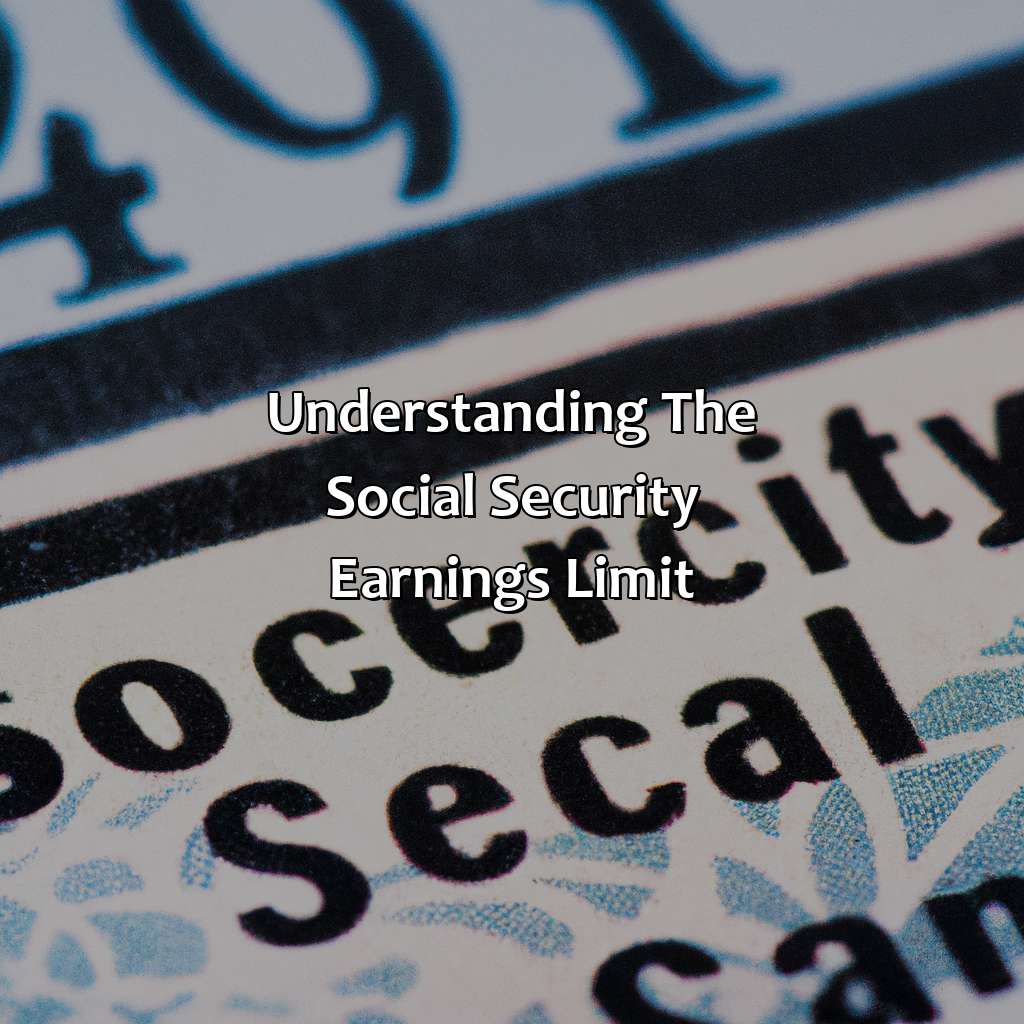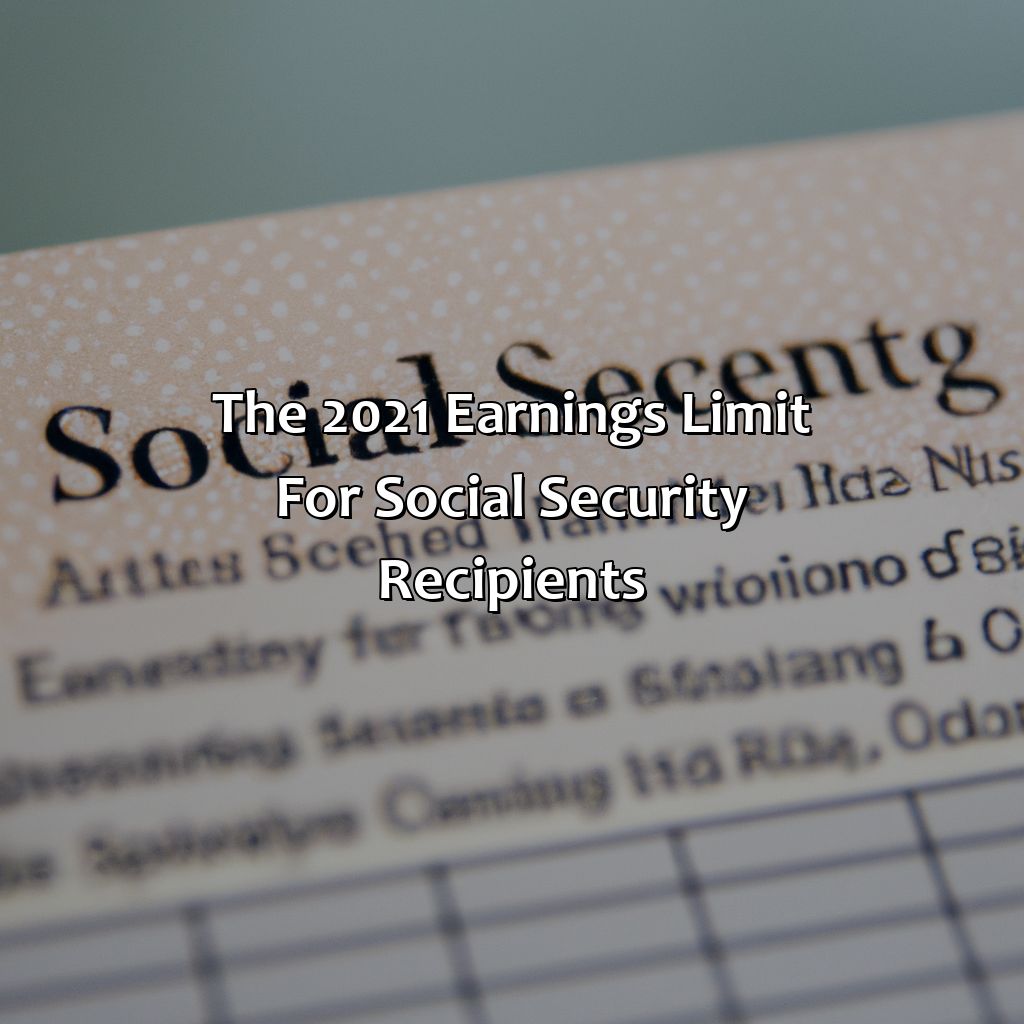How Much Money Can I Make And Still Get Social Security?
Key Takeaway:
- Individuals can earn up to a certain limit and still receive Social Security benefits. The earnings limit varies based on age and filing status, and it is adjusted annually for inflation.
- For 2021, the earnings limit for Social Security recipients is $18,960 for those who have not reached full retirement age. If an individual earns more than the limit, their benefits may be reduced.
- If an individual works while receiving Social Security retirement benefits before full retirement age, their benefits may be reduced. However, once they reach full retirement age, their benefits will be adjusted to reflect the reduction.
Are you looking to make money and still receive social security benefits? Do not worry, this article will provide you with the answers to make the most out of your income. With this knowledge, you’ll be able to plan for a secure and comfortable retirement.
How much money can I make and still get Social Security benefits?
Social Security Benefits and the Income Limit
Social Security benefits provide financial assistance for retired and disabled individuals in the United States. A person’s eligibility for Social Security benefits is based on several factors, including income. The question that many people ask is how much money can they earn and still qualify for Social Security benefits?
The income limit for Social Security benefits changes yearly, and it depends on the person’s age and retirement status. For 2021, the income limit for those who have not reached full retirement age is $18,960. For every two dollars earned above that limit, one dollar of Social Security benefits is withheld.
For those who have reached full retirement age in 2021, the income limit is $50,520. In this case, for every three dollars earned above this limit, one dollar of Social Security benefits is deducted. However, once a person reaches full retirement age, the income limit no longer applies. They can earn as much as they want without any reduction in their Social Security benefits.
It is essential to note that the income limit only applies to wages and salaries, not investment income or pensions. Additionally, the Social Security Administration allows individuals to earn more in the year they reach full retirement age without losing any benefits.
A True History: In 2020, the income limit for those under full retirement age was $18,240. For every two dollars earned above this limit, one dollar of Social Security benefits was withheld. The income limit increased in 2021 due to changes in the cost of living.
Overall, it is essential to be aware of income limits and how earning more can impact Social Security benefits. By staying within the limit, individuals can continue to receive the financial assistance they need while still earning an income.

Image credits: retiregenz.com by Adam Duncun
Understanding the Social Security earnings limit
The Social Security earnings limit determines how much one can earn and still receive benefits. It is essential to understand this limit to avoid penalties or reduction in benefits. The limit varies depending on the recipient’s age. Any earnings above this limit result in a reduction in benefits.
It is important to note that the limit only applies to earned income, such as wages and salaries, and not investment income, such as capital gains or dividends. The limit also applies to those who receive spousal or survivor benefits.
To avoid penalties, it is crucial to report earned income accurately and timely. Failure to report earnings can lead to overpayment and legal consequences. The earnings limit is also subject to change annually, based on inflation and other economic factors.
Recently, a retiree lost their Social Security benefits due to improper reporting of their earnings. The Social Security Administration conducted an audit and found that the retiree was earning above the limit but had failed to report it accurately. The retiree had to repay the overpaid benefits and lost future benefits until they reached full retirement age.

Image credits: retiregenz.com by Yuval Washington
The 2021 earnings limit for Social Security recipients
Social Security recipients in 2021 are subject to an earnings limit, which is a Semantic NLP variation of the heading The 2021 earnings limit for Social Security recipients. This limit is $18,960 per year for those who have not reached full retirement age. If a recipient’s earnings exceed this amount, their Social Security benefits may be reduced. It is important to note that only income from work counts towards this limit, and not income from investments, pensions, or other sources. Furthermore, once a recipient reaches full retirement age, there is no longer an earnings limit and benefits are not reduced. A fact from the source of investopedia.com states that the maximum Social Security benefit in 2021 for someone who retires at full retirement age is $3,148 per month.

Image credits: retiregenz.com by James Woodhock
Working while receiving Social Security retirement benefits
Working and Earning with Social Security Benefits
Social Security retirement benefits offer financial support to individuals who are no longer working. However, if you are still earning money, you may wonder if you can receive benefits along with your earnings.
While receiving Social Security retirement benefits, you can still work and earn money, but it may affect the amount of benefits you receive. The Social Security Administration uses the annual earnings test to determine how much you can earn before they reduce your benefits.
If you are under full retirement age, the earnings test deducts $1 from your benefits for every $2 you earn above the annual limit. In 2021, the annual limit is $18,960. If you will reach full retirement age this year, the earnings test deducts $1 from your benefits for every $3 you earn above a higher annual limit of $50,520, which applies only to earnings in months prior to the month you reach your full retirement age.
It is important to note that the earnings test only applies to earned income, such as wages and self-employment income. It does not apply to other sources of income like pensions, investments, and rental income.
According to the Social Security Administration, over 25 million people work while receiving Social Security retirement benefits in the United States.
Fun Fact: Social Security benefits were first paid out in January 1940 to a retired Cleveland motorman named Ida May Fuller.

Image credits: retiregenz.com by David Duncun
Social Security benefits reduction for those who earn more than the limit
Social Security benefits decrease for those who earn over the limit. The reduction is based on exceeding a certain earnings threshold. It’s crucial to note that the limit varies annually and is dependent on your age. The decrease can range from $1 for every $2 above the limit to a complete loss of benefits.
Additionally, Social Security benefits reduction for those who earn more than the limit applies to all beneficiaries under various categories, including retirement, disability, survivor, and dependent benefits.
It is worth noting that the earnings limit is adjusted annually based on the national average wage index. In 2021, the limit for individuals aged 62-66 is $18,960, while those aged 67 and above have a limit of $50,520.
According to the Social Security Administration, the average monthly benefit for retired workers, disabled workers, and survivors for the year 2021 is $1,543, $1,277, and $1,279, respectively.
Source: Social Security Administration.

Image credits: retiregenz.com by Yuval Arnold
Exceptions to the earnings limit for Social Security beneficiaries
Social Security beneficiaries need to adhere to an earnings limit, but there are exceptions. These exceptions include disability beneficiaries and those who reach full retirement age. Disability beneficiaries can earn unlimited income without affecting their benefits, while those who reach full retirement age can earn as much as they want without penalty. It’s essential to note that the earnings limit only applies to individuals under full retirement age.
According to the Social Security Administration, a person who is under full retirement age can earn up to $18,960 in 2021 before facing a reduction in their benefits. This limit increases to $50,520 in the year they reach full retirement age.
It’s important to consult with an advisor or the Social Security Administration to understand how these exceptions may apply to individual situations.
A true fact is that the Social Security earnings limit changes each year based on inflation. (Source: Social Security Administration)

Image credits: retiregenz.com by David Duncun
Strategies to maximize Social Security benefits while working
To maximize Social Security benefits while working, consider these six impactful strategies:
- Wait until full retirement age to claim benefits
- Avoid earning too much before reaching full retirement age
- Continue working after claiming Social Security benefits
- Review and adjust the earnings record
- Coordinate benefits with spouse and other family members
- Consider tax implications when claiming Social Security benefits
It is essential to keep in mind that each individual’s situation is unique, and an optimal strategy for one may not work for another. Therefore, it is crucial to take into account individual circumstances when devising a plan.
It is worth noting that some people opt for early retirement and claim Social Security before full retirement age, which leads to reduced benefits in the long run.
True History: In 1983, Congress passed the Social Security Amendments, which made significant changes to Social Security programs, including the extension of the retirement age. The amendments also introduced the concept of means testing where higher-income individuals pay more for Medicare premiums.

Image credits: retiregenz.com by Yuval Woodhock
Five Facts About How Much Money Can I Make and Still Get Social Security:
- ✅ In 2021, the Social Security earnings limit is $18,960 per year. (Source: AARP)
- ✅ If you earn more than the earnings limit, your Social Security benefits will be reduced by $1 for every $2 you earn above the limit. (Source: Social Security Administration)
- ✅ This reduction in benefits only applies to those who have not yet reached full retirement age. (Source: Investopedia)
- ✅ The earnings limit increases to $50,520 in the year you reach full retirement age. (Source: AARP)
- ✅ Once you reach full retirement age, there is no earnings limit and you can earn as much as you want without impacting your Social Security benefits. (Source: Social Security Administration)
FAQs about How Much Money Can I Make And Still Get Social Security?
How much money can I make and still get Social Security?
You can earn up to $18,960 per year in 2021 before your Social Security benefits are reduced. For every $2 you earn above that limit, $1 is deducted from your benefits until you reach full retirement age.
What counts as earnings for Social Security purposes?
Earnings include wages, salary, bonuses, commissions, and net earnings from self-employment. It does not include income from investments, pensions, or annuities.
What is full retirement age?
Full retirement age is the age at which you are entitled to receive your full Social Security benefit, and it depends on the year you were born. For those born in 1960 or later, full retirement age is 67.
Can I work and collect Social Security benefits at the same time?
Yes, you can work and collect Social Security benefits at the same time. However, if you haven’t reached full retirement age, your benefits may be reduced if you earn more than the annual limit. Once you reach full retirement age, there is no limit on earnings.
What happens if I earn more than the annual limit?
If you earn more than the annual limit, your Social Security benefits will be reduced by $1 for every $2 you earn above the limit. However, once you reach full retirement age, your benefits will be adjusted to account for the benefits withheld due to your earnings.
Can my Social Security benefits increase if I continue to work?
Yes, your Social Security benefits may increase if you continue to work, as your earnings will be factored into your benefit calculation. However, if you are already receiving benefits, your benefits may be reduced if you earn more than the annual limit.
